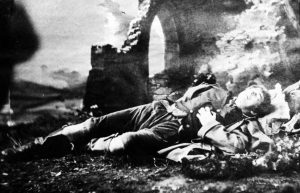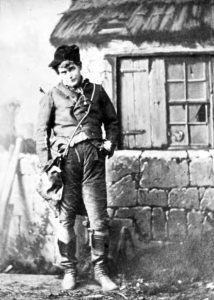
If you were planning a night out 150 years ago, chances are one of your prime options for entertainment would be a play. And, if you were seeing a play in Boston, New York, Chicago, London, Dublin, etc., chances are you would be seeing something written by Dion Boucicault. Beyond being a prominent and prolific playwright, Boucicault was also a plagiarist and intellectual property thief. In fact, “by the time Boucicault died in 1890, some obituaries had made his name a verb denoting pilfering (‘Boucicaulted the characters and the story’)” (Meer, 2015).
Boucicault was one of many plagiarist playwrights of the 1800s. Copyright and intellectual property laws of Boucicault’s time were very different from our laws today. One main difference was the lack of any international agreements that would protect a work once it gained an audience in another country. This contributed to a type of appropriation culture, where playwrights, novelists, publishers, and poets would adapt foreign works for their local communities almost as soon as those foreign works were published. One of Boucicault’s earliest jobs was to attend theatrical hits in Paris and re-write them for the London audience of his employer Benjamin Webster (Meer, 2015, p22).
Plays were also appropriated within country borders to the extent that some playwrights and theater managers employed the ‘combination system’ to combat the revenue lost when an adaptation gets to town in advance of the legitimate play. In the ‘combination system’ the “touring versions of a play [would be sent] out at the same time it was running in the metropolitan center” preventing small town theater managers from running a pirated show to capitalize on the play’s success (Blum, 2011). Though Boucicault made a name for himself as a shameless appropriator, he would also employ the ‘combination system’ to protect what he considered his original works. The play, ‘Poor of New York’ would be reworked by Boucicault into the ‘Poor of London,’ and registered, at one point, as the ‘Poor of ________’ so it could be marketed with little change as the ‘Poor of Liverpool,’ Hoboken, Dublin, or any other city name needed to make it most alluring to the audience at hand (Blum, 2011),

Boucicault’s activities adapting works and taking measures to protect his own works contributed to changing the climate of copyright law at the time. He became very familiar with the laws and court systems of multiple countries as both the defendant and the plaintiff. In Eaton Sylvester Drone’s 1879 A Treatise of the Law of Property of Intellectual Productions in Great Britain and the United States, the standard treatise on copyright in the nineteenth century, five of the copyright infringement cases highlighted as contributing to the understanding of copyright law at the time were ones where Boucicault was the plaintiff (Meer, 2015 p33).
His enduring legacy as a plagiarist and a catalyst for more modern intellectual property laws should not overshadow his great skill as a playwright, however. David Belasco, a producer, director, and playwright, would proclaim that Boucicault ‘left everything better than he found it; his pen was often inspired’ (Meer, 2015). Perhaps because of his own adventures in piracy, Boucicault was highly protective of his own work. He “believed that publication would lead to literary piracy. Thus, despite writing and producing more than 200 plays in his lifetime, only a handful of his play scripts exist in print or online for researchers, scholars, and the general public.” (Knight, et al., 2019)
In spite of this lack of surviving manuscripts, The Dion Boucicault Theatre Collection at USF Libraries is currently one of the largest publicly accessible collections of Boucicault materials in the world. The works included illustrate Boucicault’s skill at translating sensation to the stage, and many of them have extensive notes to give insight into how Boucicault expected the plays to be performed.
References
- BLUM, J. A. (2011). Adaptation, Copyright, and the Case of Dion Boucicault’s The Poor of. Performing Arts Resources, 28127-134. http://ezproxy.lib.usf.edu/login?url=http://search.ebscohost.com/login.aspx?direct=true&db=ibh&AN=65035415&site=eds-live
- Knight, M. et. Al (2019). The Dion Boucicault Collection. https://lib.usf.edu/boucicault/#slide2
- Meer, S. (2015). Adaptation, Originality and Law: Dion Boucicault and Charles Reade. Nineteenth Century Theatre & Film, 42(1), 22. https://journals.sagepub.com/doi/pdf/10.1177/1748372715617339(Blum, 2011).